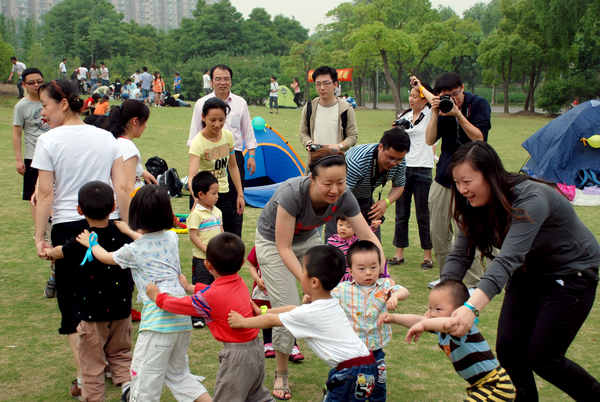Even though he helped organize the event, Sun Ming-quan still had to stand in a long line to enter his local theater, where a lecture on maintaining a balanced diet had attracted hundreds of residents.
"In general, eating a wide variety of fresh, wholesome foods has proved favorable for one's health, compared with monotonous diets based on processed foods," the lecturer told the audience.
|
 |
|
Party members who work at foreign companies in Shanghai gather with their families in a park on International Children's Day. Provided to China Daily |
Sun, the Party secretary of Middle Huaihai Road Community General Commission of the Communist Party of China in Shanghai, is not an expert in healthcare, but his efforts to promote basic dietary know-how are aided by a group of Party members at a US commodity company that specializes in promoting nutritional balance and optimal health.
"Party members in many foreign companies are at the forefront of facilitating community activities such as these. Through events like this, they have forged closer links with the Party by playing an active role in attending to the welfare of the people," Sun said.
 |
The densely populated Middle Huaihai Road in Shanghai's Central Business District is home to some 1,500 foreign-owned enterprises or joint ventures, 44 of which are listed as Fortune 500 companies.
"It is therefore imperative to unite Party members in these companies, because the non-State sector employs some of China's best talent," Sun added.
Changing attitudes
Party branches in foreign companies were in their infancy during the 1980s, when China began to open its market to investment from overseas. Ideological concerns were prevalent among many foreign investors who were reluctant to allow the establishment of Communist Party branches within their businesses.
Sun said the same question was raised time and again: China's enterprises are being encouraged to adopt modern management practices, so what role can the Party play in those organizations?
Zhu Qing, an accountant working at a Fortune 500 US car manufacturer in Shanghai, said the past five years have seen foreign businesspeople and Party members change their attitude toward Party activities at work.
"Party life used to be restricted to the circulation of documents, self-study and one-on-one talks. It was very loosely organized and members of joint Party branches met on a monthly basis," he recalled.
Joint Party branches, which consist of Party members from different companies in the same neighborhood, were created to address the fact that only a limited number of Party members were employed by foreign companies, something that tended to diminish the value of Party activities within those organizations.
The branches were formed under the auspices of the State-owned human resources agency, Shanghai Foreign Service Co. One of the agency's functions is to establish Party offices in companies and provide staff members to act as branch secretaries and organize activities.
To date, the SFSC, which serves 25,000 enterprises, has set up 486 Party branches in Shanghai-based foreign companies, consisting of 10,000 Party members.
However, despite the growing numbers involved, there were still problems. "When people of the same group hardly know each other, it is not realistic to think and act together and do something genuinely meaningful," Zhu admitted.
But the tide began to turn after a number of foreign enterprises established Party branches themselves and came up with innovative initiatives.
"Now we regularly go out on outdoor activities and perform philanthropic acts. It's more fun and engaging than before," said Zhu.
